You are currently browsing the tag archive for the ‘League of Michigan Bicyclists’ tag.
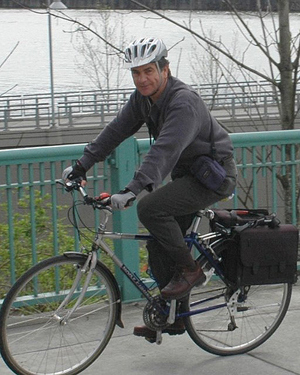 National bicycle and pedestrian expert, Michael Ronkin, was yesterday’s keynote speaker at the Michigan Transportation Planning Association and Michigan Association of Regions conference titled “Planning for Change in an Uncertain World.” The 34th annual conference started on July 13 and will conclude on the 16 and is being held in East Lansing.
National bicycle and pedestrian expert, Michael Ronkin, was yesterday’s keynote speaker at the Michigan Transportation Planning Association and Michigan Association of Regions conference titled “Planning for Change in an Uncertain World.” The 34th annual conference started on July 13 and will conclude on the 16 and is being held in East Lansing.
Yesterday’s speakers focused entirely on designing walkable and bike-able communities. Rory Neuner, State Network Manager for the Safe Routes to Schools National Partnership presented on Complete Streets while League of Michigan Bicyclists’ Executive Director Rich Moeller presented a Bikeability Assessment Guide for communities. Additionally, Meridian Township Treasurer, July Brixie highlighted her communities new Bicycle Parking Ordinance while MDOT’s Josh DeBruyn debunked liability concerns many communities have about putting in pedestrian and bicycle facilities. The nonmotorized sessions were rounded out by Dave Morena who discussed Road Diets and Wes Butch of DLZ Corp talked about roundabouts and the need to balance pedestrian mobility against motorist safety.
Following these breakout sessions, Tim Potter, manager of MSU Bikes Service Center, led a group of about 15 bikers on a tour across campus and through E. Lansing and Lansing.
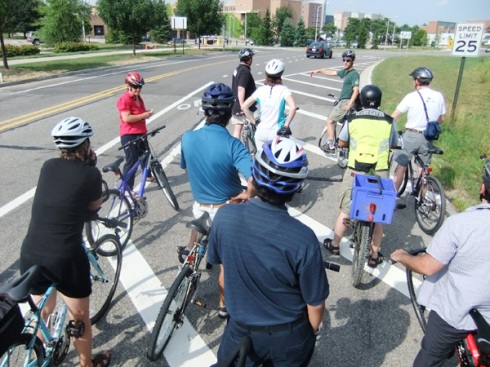 The group of bikers included not only Ronkin and Potter, but also a number of engineers, planners and politicians. Rich Moeller, Executive Director of the League of Michigan Bicyclists, said “It’s different when you see it by bike versus in your car,” “It’s hands-on (and) it allows them to get on their bike and see some of the issues bicyclists are facing. It helps them as planners and engineers to design things.”
The group of bikers included not only Ronkin and Potter, but also a number of engineers, planners and politicians. Rich Moeller, Executive Director of the League of Michigan Bicyclists, said “It’s different when you see it by bike versus in your car,” “It’s hands-on (and) it allows them to get on their bike and see some of the issues bicyclists are facing. It helps them as planners and engineers to design things.”
A short interview with Michael Ronkin was featured in today’s State News.
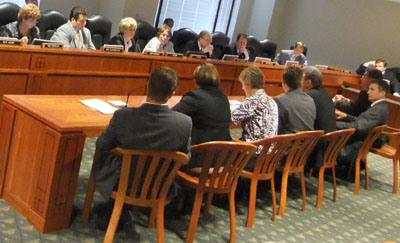
R to L: A panel of supporters including the County Road Association of Michigan, Michigan Environmental Council, Michigan Fitness Foundation, Michigan Municipal League, Michigan Trails and Greenways Alliance, AARP and Representative Jon Switalski testifying in support of HB 6151 and 6152.
The House Transportation Committee voted unanimously to pass HB 6151 and HB 6152 out of committee, with recommendations. This is a big success for Complete Streets, and the Coalition would like to thank all of the stakeholders who worked hard to negotiate a bill that was eventually able to garner such strong support. We would especially like to thank Rep. Wayne Schmidt for his leadership on this issue, as well as Rep. Pam Byrnes, Rep. John Switalski and their staffs, who put a lot of effort to achieve this victory. In hectic fashion, the final drafts of the bills were being revised right up to the last minute, modified to reflect the negotiations made between all parties involved. As Chairwoman Byrnes said, reflecting on the compromises reached, “This bill is not what everybody wants, but it’s a good step forward.”
As the result of negotiations MML, SEMCOG, MDOT and CRAM, many of whom had previously only supported the bills in concept, are now strong supporters of the legislation. The support of these organizations, in addition to the support of most of the GOP members of the committee, bodes well for the future of the bills.
The final revision of the bill no longer requires local road agencies or municipalities to pass their own Complete Streets policies. MDOT, however, is still required to pass a Complete Streets policy, along with a ‘model’ policy for municipalities and counties. As Rep. Switalski said, this version of the bill gives “cities, and locals more say when dealing with transportation policy.” The final bill also gives the Complete Streets Advisory Council a much stronger role in the planning process, allowing them to advise MDOT on the adoption of Complete Streets policies.
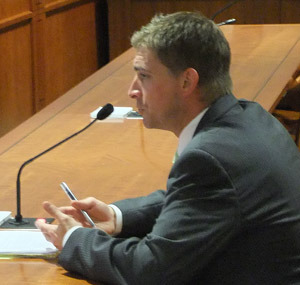
Bill sponsor, Representative Jon Switalski, makes the case for Complete Streets in Michigan before the House Transportation Committee on June 24th, 2010. The Committee went on to vote unanimously in support of the legislation.
Felicia Wasson from AARP used her brief testimony to rightly note that this is “only the beginning - a first step” for Complete Streets. According to the revision, Complete Street policies must consider the “varying mobility needs of all legal users of the roadway, of all ages and abilities.” This language does indeed represent a great first step towards ensuring that everyone is entitled to use roadways safely and conveniently.
The bills will now be referred to the House floor for a second reading, followed by a vote by the full House of Representatives. Rep. Byrnes expects that the bills will be voted on by the House relatively soon. After that, they are on to the Senate committee. It’s important to keep the energy and enthusiasm alive as the bills move forward - look for an updated action alert on our Take Action page in the next few days.
(For a complete look at the process the bills will follow as they become law, download a PDF copy of the Michigan Citizens Guide to State Government)
The Coalition would like to once again thank everyone who has worked with us to see that these bills get passed. Let’s use today’s success as a springboard to redouble our efforts, and push these important bills out of the House and through the Senate!
Additionally, League of American Bicyclists, Alliance for Biking and Walking, and the National Complete Streets Coalition all featured the efforts of Michigan’s Complete Streets movement on their blogs today.
Many more organizations and individuals provided testimony in support of Compete Streets that was entered into the record at the committee meeting as well. The following is list of links to .pdfs of those testimonies.
- Sarah Panken, Active Communities Coordinator for the Michigan Fitness Foundation
- Susan Hargter, Cyclesafe, Inc.
- Robert Prud’homme, LEED for Neighborhood Development, USGBC- Detroit Regional Chapter
- Barbara Kramer, Candidate for Dickinson County Comissioner
- MC Rothhorn, Mid-Michigan Environmental Action Council
- Jim Briggs and Carolyn Grawi, Ann Arbor Center for Independent Living
- Frank Lynn, Concerned Citizens for Improved Transit
- Dave Bulkowski, Disability Advocates of Kent County
- Gary Howe
- Michael Aughenbaugh, Revex, Inc.
- Steven A Roach
- Michael Maisner, Michigan Fitness Foundation
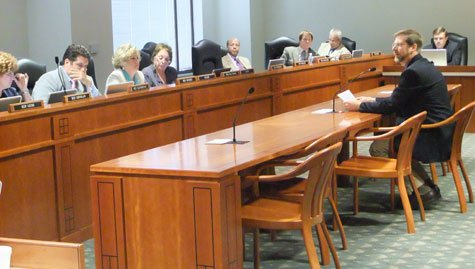
Michigan Complete Streets Coalition member, Norm Cox of the American Society of Landscape Architects used his testimony to state that HB 6152 and 6152 is "working to make amends for the lopsided transportation investments of the last 50-60 years," adding, "it's not taking money away, but redistributing it based on changing priorities."
The second House Transportation Committee hearing on Complete Streets legislation, HB 6151 and 6152, saw the room once again packed with supporters of the policies. The legislation - which seeks to move Michigan away from auto-centric road designs and meet the needs of all roadway users - has attracted strong support from a broad range of advocates. A few of the groups represented at today’s hearing included: The American Heart Association, Crim Fitness Foundation and Citizens for a Safe Community.
The coalition would like to extend thanks to all those who spoke at the meeting today, as well to those that offered written testimony. Chairwoman Byrnes (D - Dist. 52) indicated she plans to hold a vote on the bills next week, and with some organizations like SEMCOG and MML still supporting the bill in concept only, it is important that the committee members continue to hear vocal support for these specific policies.
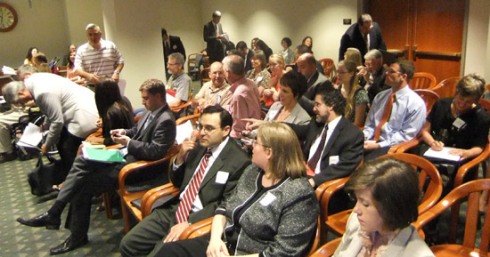
With standing room only, the room was abuzz with Complete Streets supporters on May 27th as the House Transportation Committee took testimony on HB 6151 and 6152.
It was standing room only yesterday as the House Transportation Committee took testimony on HB 6151 and 6152, Complete Streets legislation introduced by Representatives Jon Switalski and Pam Byrnes. The legislation would ensure that future road projects throughout Michigan would be required to provide safe accommodations for all roadway users such as bicyclists, pedestrians and those with disabilities.
The Coalition sincerely thanks everyone who came to the hearing and submitted testimony and cards of support. The committee members were impressed with the turnout and the amount of written testimony they received.
Providing moving testimony was Michelle Miles, mother of Jasmine Starr Miles, who was fatally struck by two cars and tragically killed in 2003 within 1,000 feet of a school zone while crossing a four lane road in Lansing. The roadway had neither crosswalks nor a sidewalk available. Cynthia Redinger of Opus International Consultants, Inc then presented a Powerpoint overview on what Complete Streets look like.
Opposition (MDOT, CRAM, MAC and MTA) is working hard to defeat these bills - as we knew they would. Their approach is that they support the concept of Complete Streets, but view these bills as an unfunded mandate. Testimony from numerous supporters of the bills, however, debunked such claims, including AARP’s Adam Goldberg and Ypsilanti Mayor Paul Schreiber who cited multiple examples of additional cost and delays in road projects in his community because of inadequate planning to accommodate nonmotorized users.
Representative Switalski’s testimony also cited recent examples in Mt. Pleasant, Kalamazoo and Traverse City where MDOT has failed to coordinate with local road agencies:
“The other component of this legislation is the coordination of the department and local road agencies on transportation projects. MDOT does great work for our state but we are asking them to do a little more when it comes to coordinating with locals on state trunklines in cities. On several occasions the department has not coordinated with local road agencies on state trunkline projects in that local road agencies’ jurisdiction.”
 Registration is now closed for the League of Michigan Bicyclists, Michigan Mountain Biking Association and Michigan Trails and Greenways Alliance 2010 Lucinda Means Advocacy Day on May 26. 85 bicyclists from across the state will be meeting in person with their representatives to voice their support for Complete Streets legislation, Michigan House Bills 6151 and 6152. If you’re unable to attend the event, you can still help out fellow bicyclists by participating in our virtual lobbying day.
Registration is now closed for the League of Michigan Bicyclists, Michigan Mountain Biking Association and Michigan Trails and Greenways Alliance 2010 Lucinda Means Advocacy Day on May 26. 85 bicyclists from across the state will be meeting in person with their representatives to voice their support for Complete Streets legislation, Michigan House Bills 6151 and 6152. If you’re unable to attend the event, you can still help out fellow bicyclists by participating in our virtual lobbying day.
GUIDE TO VIRTUAL LOBBYING:
Step 1
Sign our predrafted email to House Transportation Committee Members expressing your support for HB 6151 and 6152. Please put your first and last name in the “Name” field. You are also encouraged to personalize the message using the “Personal Statement” field. The email form can be found at http://citizenspeak.org/node/2032 (this link has been disabled).
Step 2
Call your representative – the combination of face-to-face and phone communications in support of the bills will demonstrate a strong and unified Michigan voice. By putting in your 10-digit zip code at www.votesmart.org, you can determine who your legislators are and find their phone numbers.
We encourage you to use the talking points below to send your own alert encouraging your members to participate.
TALKING POINTS:
- Complete Streets ensure that our roads are safe, more livable, and accessible to people of all ages and abilities.
- Complete Streets boosts the economy by increasing residential property values and facilitating retail and commercial development.
- Complete Streets improve safety and reduce crashes by providing pedestrian and bicycling infrastructure, such as safe crossings, sidewalks or on-road bicycle lanes.
- Complete Streets promote public health by making it safe and convenient for children and families to incorporate physical activity into their daily lives.
KEY FACTS:
- The 2001 National Household Transportation Survey reported that 50 percent of all trips in metropolitan areas are 3 miles or less, and 28 percent are 1 mile or less.
- Complete Streets policies have been adopted in 21 states, including Illinois, Minnesota and Wisconsin.
- A study in Houston found that 3 out of 5 disabled and elderly citizens do not have sidewalks between their home and the nearest bus stop.
For more specific information, please download our Complete Streets fact sheet. The National Complete Streets Coalition site also has great fact sheets by issue area if you need additional resources.
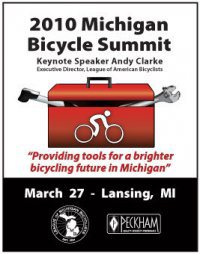 March 27th - 11:00 - 11:45am
March 27th - 11:00 - 11:45am
In the past year many exciting developments have occurred around Complete Streets in Michigan. A panel discussion at the 2010 Michigan Bicycle Summit will provide updates on these developments and provide suggestions on ways your community can go about adopting your own Complete Streets policy.
More Details/Registration:
http://www.lmb.org/index.php/events/mi-bike-summit.html
 Representative Earl Blumenauer just introduced the Active Community Transportation Act, H.R.4722. This groundbreaking bill creates a competitive grant program with $2 billion to help communities build bicycling and walking networks. For the first time, communities would be able to compete for multi-year funding to build active transportation systems, just as they do for transit and road infrastructure.
Representative Earl Blumenauer just introduced the Active Community Transportation Act, H.R.4722. This groundbreaking bill creates a competitive grant program with $2 billion to help communities build bicycling and walking networks. For the first time, communities would be able to compete for multi-year funding to build active transportation systems, just as they do for transit and road infrastructure.
“Too often we take for granted the value of being able to bike and walk to work,” said Blumenauer. “It’s unfortunate that many communities don’t have the infrastructure in place to make active and healthy forms of transportation more accessible. The ACT transportation grants will make it easier for people to get out of their vehicles and onto sidewalks or bikes, boosting both heart rates and community vitality.”
Complete the Streets
Action
The League of Michigan Bicyclists (LMB) asks the State of Michigan to:
- Design and build State roadways to accommodate all public right-of-way users safely, including bicyclists, pedestrians, people with mobility aids, motorists, and transit users of all ages and abilities.
- Require all MDOT employees involved in planning, design, construction, maintenance and operation of the State transportation system to consider fully the needs of non-motorized travelers.
- Require all recipients of Act 51 Funds to adhere to the state’s “Complete Streets” policy (see first bullet, above). Read the rest of this entry »















